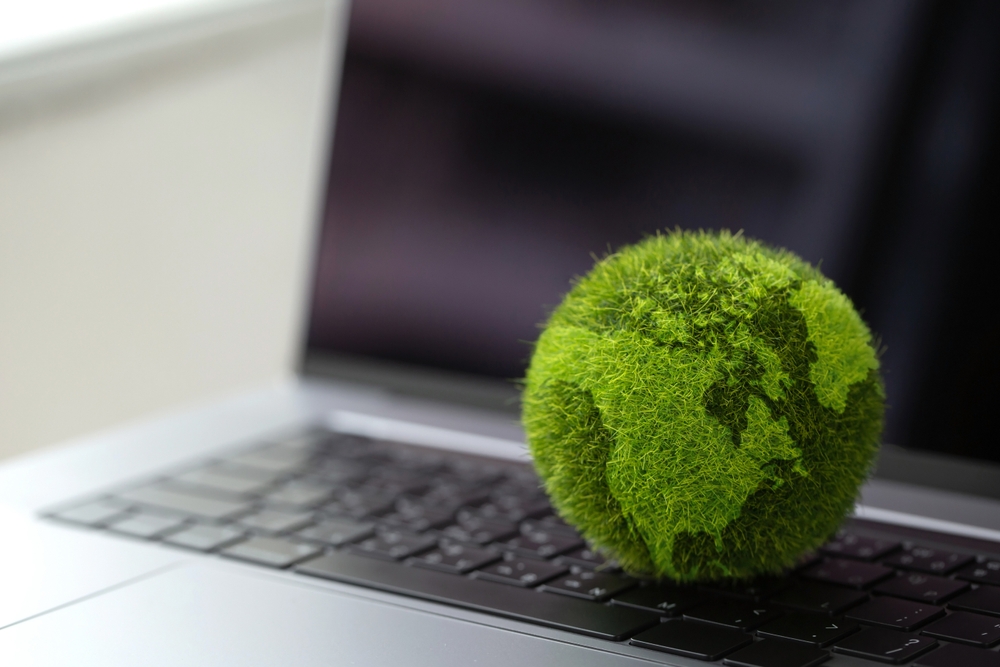
As Cop28 approaches in November, all eyes are on cutting global emissions so temperature rises stay below 1.5°C – the goal agreed at the 2015 Paris Climate talks.
Technology used by governments and businesses emits carbon – and lots of it. Enterprise technology, software designed to meet the needs of organisations rather than individuals, accounts for 1 per cent of global greenhouse gas emissions. This, according to McKinsey and Company, is equal to the total of the United Kingdom’s emissions per year.
As countries look to cut emissions, the question remains: how can IT play its part to become more sustainable?
Electronic waste is part of the problem. Shortened to e-waste, this term refers to discarded electrical or electronic devices. The UK is one of the largest per capita producers of household electronic waste. Last year the average Briton threw away nearly 24 kilos of e-waste such as plugs, mobile phones and computer hardware. Globally, the volume of e-waste is predicted to increase from more than 61 million metric tons this year to nearly 75 million in 2030, and the vast majority of this will go into landfill. This increase of non-biodegradable waste is bad in itself – and so are the emissions generated by manufacture and use over the lifetime of our devices.

Forrester Study finds that managing Chrome brings enterprises cost savings and major productivity gains.
By Chrome EnterpriseDifferent devices will be more energy efficient than others, Dr Justin Sutton-Parker, the CEO of Px3 and a research fellow at the University of Warwick, told an edition of the New Statesman Spotlight podcast. Consumers need better information on the environmental credentials of products on the market so they can make more conscious decisions.
The responsibility of reducing e-waste rests with government, businesses and consumers alike. Manufacturers can make more conscious choices about the quantities and types of products they produce, too, Sutton-Parker said.
Over 450 million desktops, notebooks and tablets are produced every year, meeting the demand of around four billion users. The fewer put into e-waste, the better. Repurposing devices that were once headed for the scrapheap is the key to achieving this. “One of the big things we’re looking into is prolonging the life cycle of the devices people already have,” Michael Wyatt, the director for Google ChromeOS EMEA, said on the podcast.
[See also: It’s time to reimagine the lifecycle of our devices]
Last year Google launched ChromeOS Flex – a sustainable solution for modernising the computer fleet an organisation already owns. It can be installed on old Windows or Mac devices so they can be secure, boot fast and update automatically. This can decrease energy consumption by around 19 per cent, and devices up to ten years old are eligible.
Many organisations are already launching more sustainable approaches to IT. Having declared a climate emergency in 2019, last year Kingston Council in south-west London switched to ChromeOS and Acer Chromebooks to accelerate progress on local sustainability goals. The council was able to reduce its carbon footprint as the more efficient devices used less energy, as well as by saving on wasteful IT upgrades. This, in addition to using efficient cloud services, met the council’s goal of “bringing sustainability to every daily activity”.
Both Wyatt and Sutton-Parker say recycling the materials from old devices, to be manufactured into new ones, is key to reducing tech emissions. End-user devices can be developed to make them more energy efficient. Becoming slimmer and more internet reliant “will reduce their carbon footprint”, for instance, noted Sutton-Parker.
There is a huge opportunity for organisations to put this into practice. Recent research from Px3 shows that switching the 2.2 million end-user computing devices used by the UK government to ChromeOS would give on average a 37 per cent saving on energy costs per device. By 2030 this would bring an annual energy saving of 23 per cent across the entire estate – nearly £9m at today’s rates. Using ChomeOS Flex, rather than updating the estate’s current devices could, over the next eight years, save over £650m in reduced procurement and utility costs. Alongside the environmental benefit, this shows the potential cost savings for organisations that pursue sustainable solutions.
“If you can prove that these things are good for the planet, and also profit, you’ll have a much higher adoption,” said Sutton-Parker.
“If you are an IT decision-maker, you can make a difference,” added Wyatt. “The thing to think about is – what sort of tech am I procuring? What devices, technology and cloud infrastructure we’re using to enable our employees to be productive and to do their work. It comes down to everyone asking the question: how can we do this in a more sustainable way?”
We can all play our part in cutting greenhouse gas emissions. For businesses, the answer can be in rethinking how they use enterprise technology. Sustainable end-user computing can be another avenue for positive change.
Trial ChromeOS Flex for yourself on an old PC or Mac for free. Download ChromeOS Flex onto a USB via the ChromeOS website.
[See also: Drowning in legacy tech: The move to sustainable computing]



